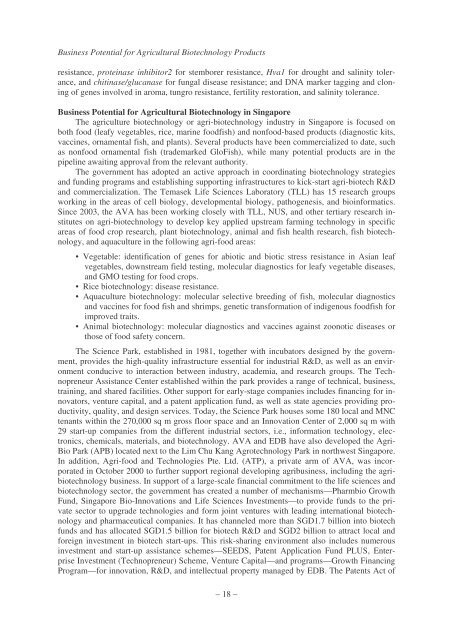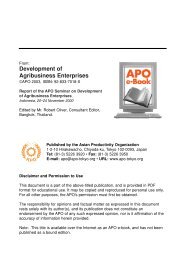Business Potential for Agricultural Biotechnology - Asian Productivity ...
Business Potential for Agricultural Biotechnology - Asian Productivity ...
Business Potential for Agricultural Biotechnology - Asian Productivity ...
You also want an ePaper? Increase the reach of your titles
YUMPU automatically turns print PDFs into web optimized ePapers that Google loves.
<strong>Business</strong> <strong>Potential</strong> <strong>for</strong> <strong>Agricultural</strong> <strong>Biotechnology</strong> Products<br />
resistance, proteinase inhibitor2 <strong>for</strong> stemborer resistance, Hva1 <strong>for</strong> drought and salinity tolerance,<br />
and chitinase/glucanase <strong>for</strong> fungal disease resistance; and DNA marker tagging and cloning<br />
of genes involved in aroma, tungro resistance, fertility restoration, and salinity tolerance.<br />
<strong>Business</strong> <strong>Potential</strong> <strong>for</strong> <strong>Agricultural</strong> <strong>Biotechnology</strong> in Singapore<br />
The agriculture biotechnology or agri-biotechnology industry in Singapore is focused on<br />
both food (leafy vegetables, rice, marine foodfish) and nonfood-based products (diagnostic kits,<br />
vaccines, ornamental fish, and plants). Several products have been commercialized to date, such<br />
as nonfood ornamental fish (trademarked GloFish), while many potential products are in the<br />
pipeline awaiting approval from the relevant authority.<br />
The government has adopted an active approach in coordinating biotechnology strategies<br />
and funding programs and establishing supporting infrastructures to kick-start agri-biotech R&D<br />
and commercialization. The Temasek Life Sciences Laboratory (TLL) has 15 research groups<br />
working in the areas of cell biology, developmental biology, pathogenesis, and bioin<strong>for</strong>matics.<br />
Since 2003, the AVA has been working closely with TLL, NUS, and other tertiary research institutes<br />
on agri-biotechnology to develop key applied upstream farming technology in specific<br />
areas of food crop research, plant biotechnology, animal and fish health research, fish biotechnology,<br />
and aquaculture in the following agri-food areas:<br />
• Vegetable: identification of genes <strong>for</strong> abiotic and biotic stress resistance in <strong>Asian</strong> leaf<br />
vegetables, downstream field testing, molecular diagnostics <strong>for</strong> leafy vegetable diseases,<br />
and GMO testing <strong>for</strong> food crops.<br />
• Rice biotechnology: disease resistance.<br />
• Aquaculture biotechnology: molecular selective breeding of fish, molecular diagnostics<br />
and vaccines <strong>for</strong> food fish and shrimps, genetic trans<strong>for</strong>mation of indigenous foodfish <strong>for</strong><br />
improved traits.<br />
• Animal biotechnology: molecular diagnostics and vaccines against zoonotic diseases or<br />
those of food safety concern.<br />
The Science Park, established in 1981, together with incubators designed by the government,<br />
provides the high-quality infrastructure essential <strong>for</strong> industrial R&D, as well as an environment<br />
conducive to interaction between industry, academia, and research groups. The Technopreneur<br />
Assistance Center established within the park provides a range of technical, business,<br />
training, and shared facilities. Other support <strong>for</strong> early-stage companies includes financing <strong>for</strong> innovators,<br />
venture capital, and a patent application fund, as well as state agencies providing productivity,<br />
quality, and design services. Today, the Science Park houses some 180 local and MNC<br />
tenants within the 270,000 sq m gross floor space and an Innovation Center of 2,000 sq m with<br />
29 start-up companies from the different industrial sectors, i.e., in<strong>for</strong>mation technology, electronics,<br />
chemicals, materials, and biotechnology. AVA and EDB have also developed the Agri-<br />
Bio Park (APB) located next to the Lim Chu Kang Agrotechnology Park in northwest Singapore.<br />
In addition, Agri-food and Technologies Pte. Ltd. (ATP), a private arm of AVA, was incorporated<br />
in October 2000 to further support regional developing agribusiness, including the agribiotechnology<br />
business. In support of a large-scale financial commitment to the life sciences and<br />
biotechnology sector, the government has created a number of mechanisms—Pharmbio Growth<br />
Fund, Singapore Bio-Innovations and Life Sciences Investments—to provide funds to the private<br />
sector to upgrade technologies and <strong>for</strong>m joint ventures with leading international biotechnology<br />
and pharmaceutical companies. It has channeled more than SGD1.7 billion into biotech<br />
funds and has allocated SGD1.5 billion <strong>for</strong> biotech R&D and SGD2 billion to attract local and<br />
<strong>for</strong>eign investment in biotech start-ups. This risk-sharing environment also includes numerous<br />
investment and start-up assistance schemes—SEEDS, Patent Application Fund PLUS, Enterprise<br />
Investment (Technopreneur) Scheme, Venture Capital—and programs—Growth Financing<br />
Program—<strong>for</strong> innovation, R&D, and intellectual property managed by EDB. The Patents Act of<br />
– 18 –
















